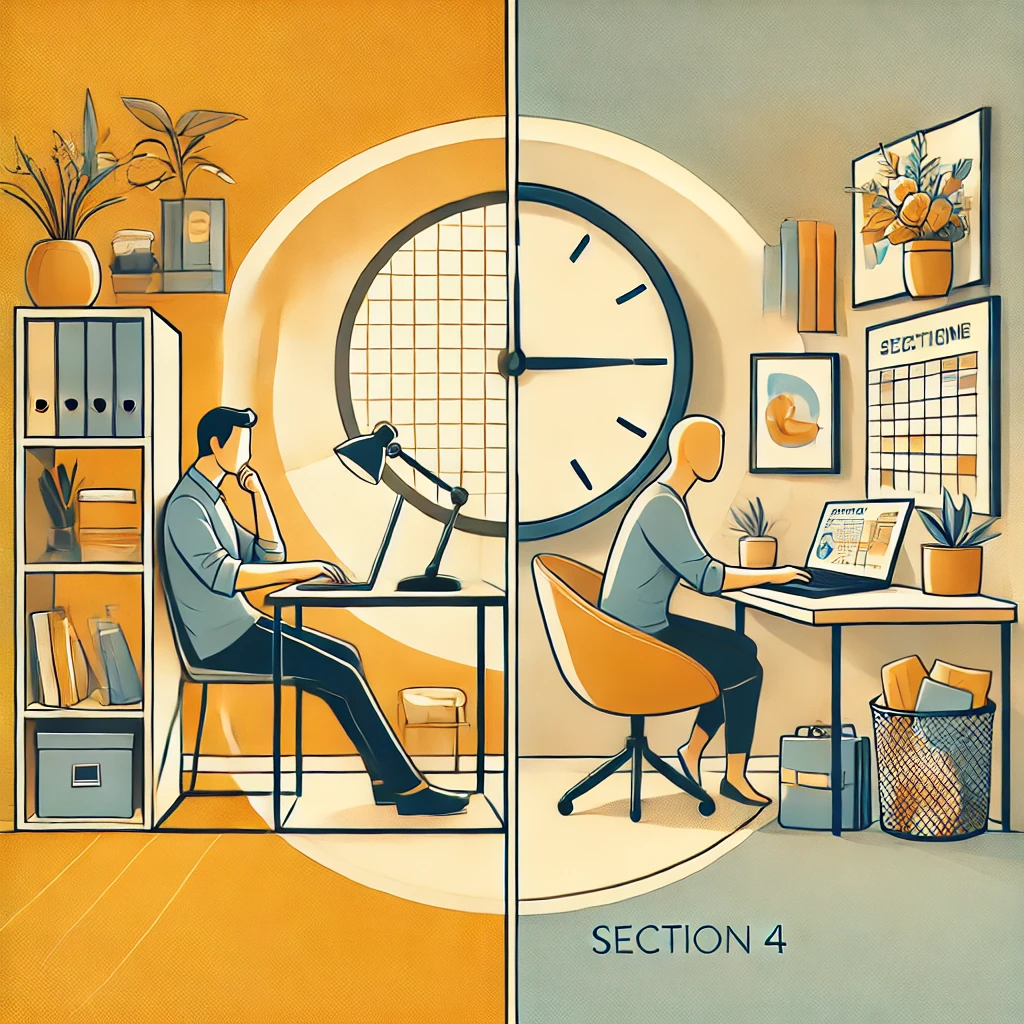
In today’s fast-paced world, the quest for career success often comes with a hefty price: a personal life that can feel neglected or overwhelmed.
Finding the right balance between achieving professional goals and nurturing a fulfilling personal life is an ongoing challenge many face.
But here’s the truth—work-life balance is not only possible, it’s essential for long-term happiness and success.
In this blog, we’ll explore practical tips and strategies to help you achieve the ultimate work-life balance, so you can thrive both professionally and personally.
Section 1: The Importance of Work-Life Balance

Understanding Work-Life Balance
Work-life balance is the act of giving adequate time, energy, and focus to both your career and personal life.
It’s not about dividing time equally but finding a healthy flow where both aspects of your life complement each other.
When you’re able to strike this balance, both your work and personal life are enriched, and you experience a sense of well-being.
Many people mistakenly believe that work-life balance means working fewer hours or constantly reducing work commitments.
However, achieving work-life balance is more about managing your energy and time wisely to avoid overworking or neglecting your personal needs.
It’s about being present in both your work and personal life while understanding that the scales will tilt at times based on your priorities.
The Physical and Mental Health Impacts of Imbalance
When work-life balance is compromised, it can lead to various negative effects on your physical and mental health. Stress is one of the most significant results of imbalance. When you’re constantly pushing yourself to meet work demands without adequate recovery time, stress levels rise. This chronic stress can lead to burnout, anxiety, and even physical health issues like headaches, high blood pressure, and sleep disturbances.
Additionally, when you don’t prioritize personal time, you risk neglecting crucial self-care activities, such as exercise, relaxation, and healthy eating. These are vital for maintaining both physical and mental health. Without time for personal pursuits, your well-being suffers, which in turn negatively impacts your productivity and focus at work.
Benefits of Achieving Work-Life Balance
Achieving a well-rounded work-life balance can yield a range of personal and professional benefits.
Here are some of the key benefits:
- Increased Productivity: A well-rested and rejuvenated mind is more productive. When you’re able to manage your energy effectively, you’re able to approach work with greater focus and efficiency, which ultimately leads to higher quality work.
- Improved Mental Health: By balancing work and personal time, you reduce the risk of stress, anxiety, and burnout. Regular breaks and time for personal pursuits help to improve mood and overall mental well-being.
- Better Relationships: When you’re able to allocate time for family, friends, and hobbies, relationships improve. Work-life balance means that you can nurture the important connections in your life, which leads to a more fulfilling existence.
- Physical Health Benefits: Achieving balance allows time for physical activities like exercise, cooking nutritious meals, or simply resting. These habits have a direct positive effect on your energy levels and long-term health.
- Enhanced Job Satisfaction: When you’re able to leave work behind at the end of the day and engage in meaningful personal activities, your job satisfaction improves. You’ll feel more motivated and engaged at work and have the energy to enjoy life outside of work.
Section 2: Common Barriers to Achieving Work-Life Balance

Overworking and Its Impact on Personal Life
One of the most significant barriers to achieving work-life balance is overworking.
This often stems from a desire to prove yourself at work, meet unrealistic deadlines, or take on more responsibilities than necessary.
Many professionals feel compelled to work long hours, even after the standard workday ends, or to extend their hours over the weekend.
While a strong work ethic is valuable, overworking can lead to exhaustion and feelings of resentment toward your career.
The toll it takes on your personal life is just as significant.
Time with family, friends, and yourself is diminished, leading to feelings of disconnection and a lack of fulfillment outside of work.
The Pressure to Always Be “On”
In today’s connected world, the expectation to be constantly available—whether it’s responding to emails at midnight, taking work calls during vacations, or working remotely beyond office hours—has blurred the boundaries between professional and personal life.
This constant “always on” pressure leaves little time for rest and recovery, disrupting your work-life balance.
Technology has made it possible to work from anywhere, but it has also contributed to the feeling of needing to be available at all times.
The ability to separate yourself from work becomes increasingly challenging, as you constantly feel like you need to check in or respond immediately.
This lack of downtime increases stress levels, reduces the quality of personal time, and ultimately affects both work and personal satisfaction.
Managing Expectations from Work and Family
Balancing work-life balance can feel impossible when you have competing demands from both work and family.
At work, there are often expectations to work overtime, meet tight deadlines, or take on additional responsibilities.
On the home front, family members may need your attention for activities, caregiving, or simply to spend quality time together.
The pressure from both sides can leave you feeling like you’re never doing enough, leading to burnout.
Managing these expectations requires clear communication with both your employer and your family.
Being transparent about what is realistic in terms of your work commitments and personal time is key to finding balance.
At work, this could involve setting boundaries and prioritizing key tasks.
At home, it might mean setting aside specific time for family without work distractions.
Balancing these expectations often requires a delicate dance, but with open communication, it’s possible to find a sustainable solution that supports both your career and your personal life.
Perfectionism and the Fear of Missing Out (FOMO)
Another common barrier to work-life balance is perfectionism.
Many professionals feel that they need to excel in every aspect of their life, whether at work, in their personal life, or in their social circles.
This desire for perfection can make it difficult to accept any level of imperfection or downtime, leaving you feeling guilty about taking breaks or relaxing.
Similarly, the fear of missing out (FOMO) on career opportunities or social events can create anxiety and an ongoing sense of urgency.
You might feel that you need to be always involved, whether in work meetings or social gatherings, fearing that stepping back will cause you to miss important developments or relationships.
Learning to accept that it’s okay not to be perfect and that it’s okay to miss out sometimes is an important step in achieving work-life balance.
Realizing that your health, well-being, and happiness are more important than being everywhere at once can help you make better choices about how to spend your time.
By recognizing and understanding these barriers, you can start taking proactive steps toward improving your work-life balance.
Awareness is the first step in creating a healthier, more sustainable balance between your career and personal life.ents is a constant challenge.
Without clear boundaries, the scales tip in favor of one or the other, leaving you feeling overwhelmed and underachieving on both fronts.
Section 3: Practical Tips to Achieve a Better Work-Life Balance

Set Clear Boundaries Between Work and Personal Time
One of the key components of achieving work-life balance is establishing and respecting boundaries between your work and personal life.
Setting clear boundaries means designating specific times for both professional and personal activities, so neither area infringes on the other.
- Establish work hours: Define your working hours and commit to them. If you’re working from home, this is even more important to avoid letting work spill over into personal time.
- Communicate boundaries: Be clear with your colleagues, boss, and family about when you are available and when you are off-limits for work discussions. This helps create mutual respect for your personal time.
Boundaries also extend to the digital world. Use “Do Not Disturb” modes or app settings to prevent work-related notifications during your off-hours.
This helps you mentally disconnect from work and focus on personal activities.
Prioritize Your Tasks Effectively
To maintain a healthy work-life balance, it’s crucial to prioritize tasks based on their importance and urgency.
This strategy helps you focus on what truly matters without becoming overwhelmed by a long to-do list.
- Use the Eisenhower Matrix: Divide tasks into categories based on urgency and importance. This will help you tackle the most important tasks first and avoid wasting time on less crucial ones.
- Break tasks down: Large tasks can feel intimidating. Break them down into smaller, manageable steps to avoid feeling overwhelmed and reduce procrastination.
- Learn to say no: Understand that you don’t have to say yes to every request. Politely declining non-essential tasks is an essential part of preserving your work-life balance.
By effectively prioritizing tasks, you can focus your time and energy on what truly matters—allowing you to maintain balance and avoid burnout.
Schedule ‘Me Time’ and Make It a Non-Negotiable
Personal time or “me time” is essential for achieving work-life balance.
Scheduling time for yourself ensures that you don’t neglect self-care, hobbies, or relaxation amidst the demands of work and family life.
- Block off personal time: Treat your personal time like a work meeting by scheduling it into your calendar. Whether it’s for exercise, meditation, or enjoying a hobby, make sure it’s non-negotiable.
- Engage in activities you love: Take time to engage in activities that recharge you—whether it’s reading, walking, cooking, or spending time with loved ones.
- Avoid work intrusion: During your personal time, resist the urge to check work emails or answer work calls. This helps to truly disconnect and recharge.
Making “me time” a priority will not only improve your mental health but also enhance your productivity and focus when you’re back at work.
Learn to Delegate and Say No When Necessary
You don’t have to do everything yourself to maintain a successful work-life balance.
Learning to delegate and say no is essential for protecting your time and energy.
- Delegate tasks at work: If you’re managing a team, delegate tasks to others who are capable of handling them. This allows you to focus on higher-priority responsibilities and prevents you from feeling overburdened.
- Delegate at home: Similarly, at home, share responsibilities with family members. Don’t take on all the household duties if it’s unnecessary.
- Set limits at work: Learn to say no when you’re asked to take on additional tasks that would compromise your personal life. Setting limits helps you avoid overextending yourself and ensures that your work-life balance stays intact.
By delegating and saying no, you free up time for important activities that promote a fulfilling personal life.
Section 4: How to Incorporate Flexibility into Your Work Life

Embracing Remote Work and Flexible Hours
Flexibility is a powerful tool in achieving work-life balance, especially for those with family commitments or busy schedules.
Remote work and flexible hours offer the opportunity to structure your day in a way that aligns with your personal life.
- Take advantage of remote work: If your job allows it, work from home to save time on commuting and create a more comfortable, personalized workspace.
- Set your own hours: If possible, negotiate flexible work hours with your employer. This allows you to attend to personal commitments or enjoy downtime without sacrificing work responsibilities.
- Create a flexible routine: Once you have control over your work schedule, create a routine that allows for balance. Include time for family, self-care, and work-related activities.
By embracing flexibility, you not only improve your work-life balance but also gain greater control over your schedule and well-being.
Creating a Work Environment That Supports Balance
Your work environment plays a significant role in how well you can achieve work-life balance.
Whether you’re working from home or the office, a conducive work environment can help you stay focused, efficient, and stress-free.
- Design your workspace: If working from home, create a separate, quiet space for work that is free from distractions. This allows you to mentally switch between work and personal time.
- Ergonomic setup: Invest in an ergonomic chair and desk to ensure comfort during long hours of work. A comfortable setup reduces physical strain and helps you stay focused.
- Keep work areas tidy: A clean and organized workspace can boost productivity and reduce mental clutter, making it easier to maintain focus and separate work from personal life.
A well-designed work environment will help you stay productive while still creating the space you need to balance your career and personal life effectively.
Setting Realistic Goals and Managing Expectations
To achieve work-life balance, it’s crucial to set realistic goals for both your career and personal life.
Avoid overloading yourself with too many expectations or tasks that are impossible to complete.
- Set achievable goals: Establish clear, achievable goals for your work and personal life. This helps you stay focused and prevents feelings of failure or frustration when things don’t go as planned.
- Break down larger goals: Breaking down larger goals into smaller, manageable tasks allows you to track progress and feel a sense of accomplishment without becoming overwhelmed.
- Manage external expectations: Communicate your limits to others—whether it’s your boss, family members, or friends. Setting clear boundaries helps others respect your time and supports your overall work-life balance.
Realistic goal setting ensures you stay on track without overextending yourself, making it easier to manage both your career and personal life.
The Power of Saying No and Managing Stress
Stress is a natural part of life, but managing it is essential for achieving work-life balance.
Learning to say no to excessive work commitments and outside demands can help prevent stress from taking over.
- Say no when needed: Politely decline additional responsibilities that will interfere with your ability to maintain balance. This helps reduce unnecessary stress and keeps you focused on what matters most.
- Practice mindfulness: Incorporate mindfulness practices such as meditation or deep breathing into your day to manage stress and maintain clarity in both your personal and professional life.
Saying no when necessary and managing stress effectively ensures that your work-life balance remains intact, and you avoid burnout or overwhelm.
By integrating these strategies for flexibility and balance into your work life, you can create a structure that supports both professional success and personal fulfillment.
With a combination of clear boundaries, effective time management, and a flexible work environment, you’ll be well on your way to achieving lasting work-life balance.
Section 5: The Role of Technology in Achieving Work-Life Balance

How Technology Can Help You Stay Organized
Leverage productivity apps like Trello or Asana to manage tasks and timelines efficiently.
These tools can help streamline your workflow, reducing the time you spend on work, and giving you more time to focus on personal priorities.
Leveraging Productivity Apps to Improve Efficiency
Apps like Google Calendar or Toggl help track work hours and set reminders, ensuring that work tasks don’t spill over into personal time.
By using technology effectively, you can better manage your schedule and maintain work-life balance.
Managing Work-Life Boundaries with Tech Tools
Set clear boundaries by using technology to limit access to work-related communication during off-hours.
Features like “Do Not Disturb” or email scheduling tools ensure that work doesn’t invade your personal time.
Section 6: The Impact of Work-Life Balance on Long-Term Career Success

How Balance Can Boost Creativity and Productivity
When you achieve a healthy work-life balance, you reduce stress and burnout, leading to improved creativity and productivity at work.
You’re able to bring your best self to both your career and personal life, leading to sustained success in the long run.
Building a Sustainable Career Through Better Balance
Over time, practicing work-life balance prevents career burnout and promotes job satisfaction.
It allows you to maintain your enthusiasm and drive, contributing to long-term career success without sacrificing your personal life.
The Connection Between Personal Well-Being and Career Growth
Your well-being outside of work directly influences your performance at work.
When you focus on maintaining work-life balance, you ensure that your health, relationships, and passions continue to thrive, leading to sustained success in your career.
Achieving work-life balance is not about perfection—it’s about making small, intentional changes that promote harmony between your personal and professional life.
With the right strategies, clear boundaries, and a willingness to prioritize, you can have both a fulfilling personal life and a successful career.
Start today by incorporating these tips, and see how balancing your life will not only improve your health and happiness but also enhance your career growth.
The key to thriving in both areas lies in finding that sweet spot where you can truly have it all.
Related Articles:
Stop Wearing Pajamas! 15 Chic Work-From-Home Outfits That Feel Just as Comfy
